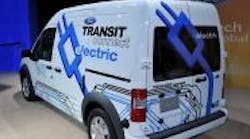“Electric vehicles have enormous potential for creating a cleaner transport system … however, there is uncertainty over the pace of vehicle development, consumer take up and patterns of usage and charging. It is also important we anticipate the likely requirements these developments will have for grid enhancement and the need for an intelligent architecture.” –Jon Bentley, energy & environment partner, IBM Global Business Services.
Now here’s an interesting study just getting started over in the United Kingdom (the “U.K.,” which still refers to England, Wales, Scotland and – grrrr – Northern Ireland) concerning the impact widespread use of electric vehicles (EVs) might have on the electrical grid.
This is a VERY important issue, because one of the main selling points of a wholesale shift to EVs revolves around the use of “off-peak” electricity to meet re-charging needs. That is, EV owners – fleets and individual motorists alike – would conduct recharging at times when electrical demand is low, such as at night or the wee hours of the morning.
[This is part of the larger puzzle know as a “smart grid,” whereby supply and demand for electrical power is precisely monitored and managed. The clip below gives some insight into this concept.]
Of course, knowing the vagaries of humanity, this theory could become completely unraveled in practice – with significantly more recharging occurring during peak hours, thus putting more strain on the electrical system. And what fallout might result from THAT trend line?
Well, IBM and the U.K.-based Energy Technologies Institute (ETI) plan to find out – joining forces on a study to evaluate the potential impact of electric vehicles on the U.K.’s electricity grid while also assessing the infrastructure required to achieve a mass market for electric and plug-in hybrid electric vehicles in that conglomeration of countries.
IBM says it will lead the co-ordination of a consortium of companies – EDF Energy, E.ON and Imperial Consultants (I wonder if THEY employ a 'Czar' or two a la NFI on this side of the pond?)– in conducting this study, which is happening none too soon, for the U.K.'s government has already committed 300 million pounds (more than $452 million US) to create a recharging infrastructure for all-electric and plug-in hybrid vehicles – totaling some 11,000 charge points across areas in London and the South East, the Midlands and the North East in England alone.
The IBM led research is one of three projects costing 4.5 million pounds (over $6.7 million US) launched as part of the ETI's 11 million pound (over $16.5 million US) Electrification of Light Vehicles program. The other projects will assess the economic and carbon benefits as well as the consumer behavior patterns linked to the mass roll-out of plug-in vehicles, ETI said.
[Another critical issue outside of “consumer acceptance” of EVs is the technology itself – especially when it comes to the batteries required to store the electricity necessary for powering the vehicles. Here’s a clip discussing “The Battery 500” project, which seeks to beef up the capability of EV energy storage systems.]
Together the projects are intended to propose an overall system architecture for integrating plug-in vehicles considering, noted Jon Bentley, energy & environment Partner with IBM Global Business Services, including electricity networks, charging points, and payment systems and helping to ensure compatibility across the U.K. (And this is an area of research IBM has worked in for some time, too, I might add.)
“We need to take action now to ensure lead times are put in place for open and interoperable architectures, while allowing time to monitor the positive impact on the electric vehicle market,” he added. “Furthermore, we need to achieve these goals alongside related programs in ‘smart grids’ and ‘smart metering,’ the shift to a renewable generation and the development of smart homes which are already under-way and gaining momentum.”
Here are some of the other key areas this research project will look at:
• Analysis of how growth in electric vehicle recharging could impact electricity distribution networks, and what steps energy companies could take to overcome any barriers to supplying demand.
• Identification of the smart infrastructure needed for mass market uptake of electric vehicles in the U.K.
• Design concepts for the 'intelligent architecture' of interconnected data and systems needed to enable local networks of electric vehicle charging points linked to the distribution networks.
• Planning for design changes which maintain effective operation and management of the electrical distribution network
• Assessment of current issues and likely future developments involving regulatory, legislative and commercial matters related to the recharging infrastructure.
The ETI said this study dovetails with its effort to start real-world testing of consumer attitudes towards all-electric and plug-in vehicles, as well as build out of supporting infrastructure through 2010 and into 2011.
I’ll be more interested in seeing if the economics of EVs and plug-in hybrids shakes out from this research, whether recharging will occur “off-peak” as expected, and if – over the long-term – electricity can really turn out to be a successful replacement for petroleum when it comes to motorized vehicles.




